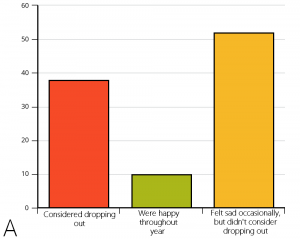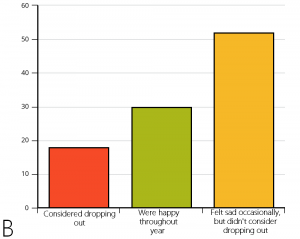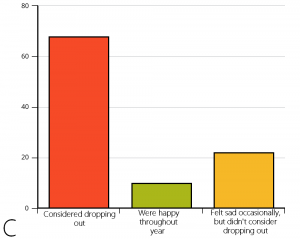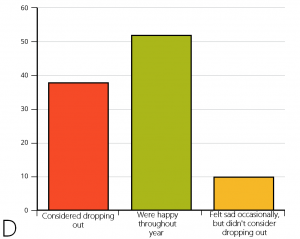Section 3
Question 21
Which graph shows what students reported feeling after a year at school?




Questions 22-25
Which student will present which information?
A Gale
B Lindsay
C Kevin
Write the correct letter, A, B or C
22 the research focus ___
23 the focus group of the research ___
24 how the students acquired access to the focus group ___
25 the structure of the survey used in the research ___
Questions 26-30
Complete the sentences below with NO MORE THAN TWO WORDS AND/OR A NUMBER.
26 The number of males and females participating in the study was _________.
27 _________ percent of the participants came from Europe.
28 The vast majority of the participants were 20 or 21 years old, and only _________ percent were 19.
29 Most participants reported missing home and/or suffering from_________ at the start of their course.
30 The students examined the _________ of the previous two years to ensure the numbers in their research were as accurate as possible.
Section 4
Questions 31-37
Answer the questions below, write NO MORE THAN THREE WORDS AND/OR A NUMBER.
31 How many English speakers are there around the world today? _________
32 Aside from French, which other language does the speaker say was more widely spoken than English in the 19th century? _________
33 Who does the speaker believe will determine the future of English? _________
34 What is the alternative name for English pidgin and creole languages? _________
35 What does “longi” mean? _________
36 According to the speaker, which language has a history which is very similar to
English? _________
37 What kind of languages are Spanish, French, and Italian? _________
Question 38-40
Choose the correct letter, A, B or C.
38 The speaker says that Jamaican and South African English
A are very traditional languages.
B have greatly influenced the English language.
C were created very recently.
39 According to the second theory mentioned by the speaker, English
A might lose some of its more complex features in a global level.
B might become even more complicated than it is now.
C might be called ‘Globish’.
40 English is a unique language because
A it has the largest number of speakers in the world.
B it hasn’t changed much throughout human history.
C it’s spoken by a larger number of non-natives than any other language.
Answer Keys
| Listening Section 1 1 John Sparrow 2 24th January 3 Athens, Greece 4 9.45 5 Hypnos 6 95 euros 7 light meal 8 Asian vegetarian 9 dairy products 10 24 hours | Listening Section 2 11 A 12 C 13 D 14 E 15 C 16 B 17 C 18 different name 19 social media 20 ready for editing |
| Listening Section 3 21 A 22 B 23 C 24 A 25 B 26 almost equal 27 17.97 28 5 29 mild depression 30 drop-out rate | Listening Section 4 31 2.1 billion 32 German 33 non-native speakers 34 Englishes 35 trousers 36 Latin 37 Romance (languages) 38 B 39 A 40 C |
 Click to download this IELTS Listening Test in PDF
Click to download this IELTS Listening Test in PDF

